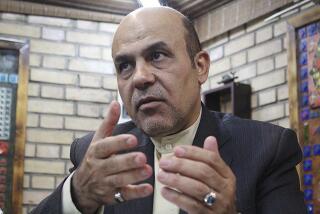Soldier Convicted in Kuwait Base Killings
- Share via
WASHINGTON — A Muslim Army sergeant was found guilty Thursday of killing two officers and wounding 14 of his comrades in a nighttime grenade-and-rifle attack in Kuwait as his engineering platoon was preparing to join the invasion of Iraq.
Sgt. Hasan Akbar could be sentenced to death; the penalty phase of his court-martial at Ft. Bragg, N.C., is set to begin Monday. His conviction, after less than three hours of jury deliberations, makes him the first American since the Vietnam War to be prosecuted for killing a fellow soldier during wartime.
The 34-year-old Akbar, who was raised in South Los Angeles, stood at attention and bit his lip when the verdict was announced.
Military prosecutors said that he had planned the attack, typing his intentions in a daily computer diary he kept while he and his 101st Airborne Division comrades were preparing to ship out to the Middle East. “I am going to try and kill as many of them as possible,” he wrote.
But his lawyers argued that Akbar was mentally unbalanced and shouldn’t have been in the Army, much less near a combat zone where Muslims were the enemy.
They also said that he was deeply bothered by slurs from other soldiers against his religion.”He is mentally ill,” defense lawyer Maj. Dan Brookhart said in closing arguments.
Akbar was convicted of the premeditated murder of Army Capt. Christopher Seifert, 27, who was shot in the back, and Air Force Maj. Gregory Stone, 40, who was hit with 83 pieces of shrapnel in the attack.
He also was found guilty of attempted premeditated murder in the wounding of 14 other soldiers.
Akbar faces three possible sentences: death by lethal injection, life in prison without parole, or life with the possibility of parole.
The government has said that his calculating crime warrants his death; the defense contends that his mental state is a reason to spare his life.
The March 23, 2003, attack occurred at the temporary Camp Pennsylvania in Kuwait.
According to evidence and testimony in the case, Akbar turned off an outside power generator, darkening the area around tents used by officers. He tossed an incendiary grenade into one tent and, as officers ran out -- making themselves better targets -- he threw a fragmentary grenade.
Akbar then yelled: “We’re under attack!” and rolled a grenade at a second tent. He lobbed another grenade into a third tent, then hunched down in the darkness and fired his rifle at solders fleeing the burning campsite.
“Sgt. Akbar executed that attack with a cool mind. He sought maximum carnage,” Capt. Robert McGovern, one of the prosecutors, told the jurors.
On Thursday, when pictures of bodies at the camp were shown on a large television screen, some of the victims’ relatives broke into tears. Akbar quietly sipped from a coffee mug.
Akbar was born Mark Fidel Kools. His parents, Muslim converts, changed his name to Hasan (meaning handsome in Arabic) Akbar (greatest).
He was a gifted student who spent afternoons studying at the Masjid Bilal Islamic Center on Central Avenue in Los Angeles, where he was remembered as a loner, quiet and reserved, but also very devoted to Islam.
He graduated from Locke High School and earned an engineering degree from UC Davis. He was the first member of his family to finish college, even though it took him nine years to graduate. His parents were surprised when he then joined the Army.
His father, John Akbar of Seattle, testified in the court-martial that other members of his son’s platoon wore Nazi, KKK and Confederate flag tattoos. “They would mock him while he prayed,” the father said.
Defense lawyers said that had clouded Akbar’s thinking and led him to despair. But that kind of treatment was never substantiated in the trial.
Prosecutors showed the jury diary entries that Akbar had typed into his personal computer before deploying for the Middle East.
“I suppose they want to punk me or just humiliate me,” he said in one entry, complaining of harassment. “I am not going to do anything about it as long as I stay here. But as soon as I am in Iraq, I am going to try and kill as many of them as possible.”
If sentenced to die, Akbar would join five other soldiers on military death row at Ft. Leavenworth, Kan. No soldier has been executed since 1961.
*
Associated Press contributed to this report.
More to Read
Sign up for Essential California
The most important California stories and recommendations in your inbox every morning.
You may occasionally receive promotional content from the Los Angeles Times.











